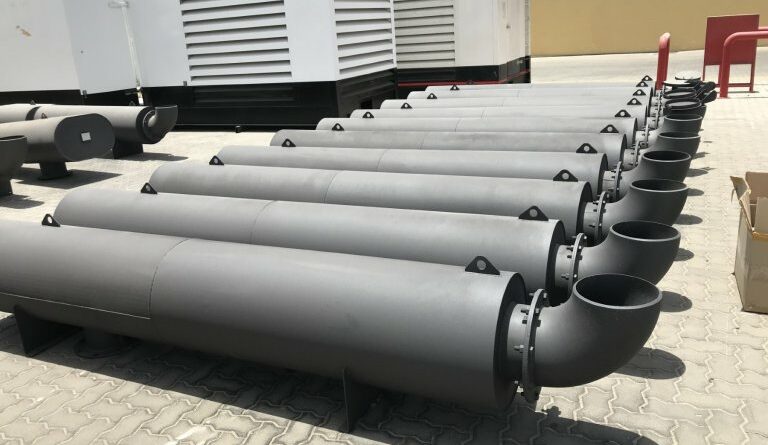Understanding the Role and Benefits of a Generator Muffler
Generators are an essential tool for various settings, whether you’re powering a remote construction site, supplying backup power during an outage, or camping in the wilderness. They come in different sizes and power capacities to meet various needs. However, one common issue with generators, especially larger models, is the noise they produce. This noise can be disruptive and cause discomfort for both the user and others nearby. This is where the generator muffler plays a crucial role in improving the overall experience.
A generator muffler is a device designed to reduce the noise output of a generator, making it more suitable for residential, commercial, and recreational use. In this blog, we will explore the importance of a generator muffler, how it works, its benefits, and how to choose the right one for your generator.
What Is a Generator Muffler?
A generator muffler, often referred to as a silencer, is a mechanical component attached to the exhaust system of a generator to reduce the noise it produces during operation. Similar to the muffler in a car or motorcycle, a generator muffler works by controlling the sound waves created as exhaust gases exit the engine. The primary function of the muffler is to decrease the decibel levels of the engine’s exhaust system and ensure that the generator operates more quietly.
The muffler itself consists of an inlet, outlet, and an internal chamber that is designed to dissipate and absorb sound. As exhaust gases flow through the muffler, they are directed through perforated tubes or chambers that reduce the intensity of sound waves, ultimately lowering the noise that reaches the surroundings.
How Does a Generator Muffler Work?
To understand how a generator muffler works, it’s helpful to know a bit about sound and how it’s generated in an engine. Internal combustion engines, like the ones used in generators, work by igniting fuel in the engine cylinders. This combustion creates gases that rapidly expand and need to be expelled from the engine. The process of releasing these exhaust gases creates noise as sound waves are produced by the pressure of the gases being forced out of the engine.
The muffler counteracts this by forcing the exhaust gases to pass through multiple chambers and tubes. These sections allow sound waves to dissipate and cancel each other out, reducing the overall volume of the noise produced. The more intricate the design of the muffler, the more efficient it is at reducing noise.
Benefits of Using a Generator Muffler
Noise Reduction The most obvious benefit of a generator muffler is noise reduction. The internal combustion engine in a generator can be loud, especially in larger models that are built to generate significant amounts of power. A muffler helps to bring down the decibel levels, creating a quieter operation. This is especially important if you’re using the generator in residential or recreational areas where noise restrictions might apply.
Improved Comfort Whether you’re using a generator for work, leisure, or as a backup power source, excessive noise can make the experience uncomfortable. The muffler helps improve your comfort by lowering the noise levels, allowing you to work, relax, or sleep without being disturbed by the constant drone of the engine.
Compliance with Regulations Many local governments and municipalities have strict noise ordinances, especially in residential areas or national parks. A generator with a muffler ensures that you comply with these regulations, avoiding potential fines or complaints from neighbours. Whether it’s for home use or commercial purposes, choosing a generator with a muffler can help ensure you are operating within the legal noise limits.
Enhanced Generator Lifespan A generator muffler also serves the purpose of protecting your generator from harmful exhaust fumes and excessive heat. By reducing the noise, the muffler can also help maintain optimal engine performance, reducing wear and tear caused by high temperatures and vibrations. In turn, this could help extend the overall lifespan of your generator.
Environmental Impact Reducing noise pollution is an often-overlooked environmental benefit of a generator muffler. Noise pollution can affect wildlife and disturb the natural environment. By muffling the noise, you help minimize the impact on surrounding ecosystems, which is particularly important when operating in outdoor or natural areas.
Types of Generator Mufflers
When selecting a muffler for your generator, there are several types available. The type you choose should depend on the size and type of generator you own, as well as your specific needs. Here are the main types of generator mufflers:
Standard Mufflers
These are the most common types of mufflers and are typically included in most generator models. They are designed to provide basic noise reduction and are ideal for residential and light commercial use.
Residential Mufflers
These are specifically designed for quieter operation in residential areas. Residential mufflers are larger and more sophisticated in design, providing a higher level of noise reduction compared to standard models.
Industrial Mufflers
For larger generators used in industrial or commercial applications, industrial mufflers are required. These mufflers are built to handle the intense noise produced by larger engines while maintaining efficient power generation.
Aftermarket Mufflers
If your generator doesn’t come with a built-in muffler or if you want to upgrade to a quieter one, aftermarket mufflers are available. These mufflers can be installed externally and are often designed to be more effective in reducing noise than the standard ones.
How to Choose the Right Muffler for Your Generator
Choosing the right muffler for your generator depends on several factors, such as the generator’s size, intended use, and the level of noise reduction needed. Here are some considerations:
Size and Power Output
Larger generators typically produce more noise, so you will need a more powerful and efficient muffler to handle the increased exhaust volume. Ensure that the muffler is compatible with the size and power rating of your generator.
Noise Level Requirements
Determine how quiet you need your generator to be. If you’re using it in a residential area, you may want a muffler that offers more substantial noise reduction. On the other hand, if noise is not a major concern, a standard muffler may be sufficient.
Material and Durability
Mufflers are made from various materials, including stainless steel and aluminized steel. Stainless steel is more durable and resistant to rust, while aluminized steel is cost-effective and offers reasonable durability. Choose a material based on your budget and the environmental conditions in which the generator will operate.
Conclusion
A generator muffler plays a vital role in reducing noise pollution, ensuring comfort, and enhancing the overall efficiency of a generator. Whether you’re using your generator for work, recreation, or as a backup power source, investing in a high-quality muffler is a smart choice. Not only will it make your environment more pleasant, but it will also help you meet regulatory requirements and extend the life of your equipment. By choosing the right muffler, you can enjoy the full benefits of your generator without the nuisance of excessive noise.




